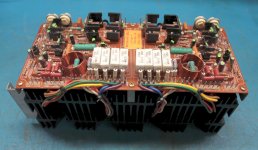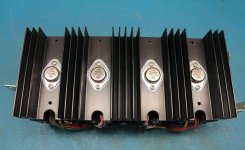This receiver plays well for about 5 minutes then the right channel develops static and cuts out. Then the static begins to affect the left channel as well.
All lighting remain steady, as well as the current drain.
All the controls have been cleaned, Deoxed and tested.
The power supply has been re-capped (new electrolytics) and every transistor/fet was tested out of circuit, then re-installed, applying fresh thermal compound as needed.
The main amplifier has been completely restored, including brand new output transistors.
I've narrowed the search a bit by removing the main amp and used the preamp out to another receiver to monitor the situation. Hence, the main amp is not in question.
I've checked all the wiring, interconnects and the pc boards were examined under an inspection scope for bad solder joints, open or shorts, but found nothing out of order.
I suspect the problem lies within the P800 power supply board, but I can't be certain.
Nothing gets unusually warm and I've applied freeze spray and a heat gun all around the board to no effect.
This board is a bear to remove, but if I have to, I may be forced to shotgun all the transistors in hopes that will cure the issue.
But before doing anything rash, I'd appreciate any help to pinpoint the source of the problem.
Again, this is the 2330B - Much different from a 2330.
All lighting remain steady, as well as the current drain.
All the controls have been cleaned, Deoxed and tested.
The power supply has been re-capped (new electrolytics) and every transistor/fet was tested out of circuit, then re-installed, applying fresh thermal compound as needed.
The main amplifier has been completely restored, including brand new output transistors.
I've narrowed the search a bit by removing the main amp and used the preamp out to another receiver to monitor the situation. Hence, the main amp is not in question.
I've checked all the wiring, interconnects and the pc boards were examined under an inspection scope for bad solder joints, open or shorts, but found nothing out of order.
I suspect the problem lies within the P800 power supply board, but I can't be certain.
Nothing gets unusually warm and I've applied freeze spray and a heat gun all around the board to no effect.
This board is a bear to remove, but if I have to, I may be forced to shotgun all the transistors in hopes that will cure the issue.
But before doing anything rash, I'd appreciate any help to pinpoint the source of the problem.
Again, this is the 2330B - Much different from a 2330.
Attachments
Sorry to hear this. Did it become intermittent gradually after the renovation, or was it always intermittent since the work?
I'm not sure about that. I'm restoring this for an old friend who said that it stopped working many years ago. It was dirty and corroded and after many long hours and mucho $$$ in new parts, it look like new again. What made the job more difficult is all the board interconnects were wire-wrapped. I had a previous problem on the P800 board with the protection relay not engaging. It was due to a transistor being re-installed backwards. I replaced it with a new one. Perhaps other components were damaged? Hard to tell.
Have you looked at the PS to the boards with a scope?
Also, you said the main board is fine, have you used the same methodology to test the preamp with a known good amp / amp stage of a receiver? I'm guessing you have, but still have to ask.
Also, you said the main board is fine, have you used the same methodology to test the preamp with a known good amp / amp stage of a receiver? I'm guessing you have, but still have to ask.
Hello 'A Sound Mind',
Let's take this from the top: Do you have the same symptom on all source inputs? (Tuner, Phono, Aux(s) etc.)
Let's take this from the top: Do you have the same symptom on all source inputs? (Tuner, Phono, Aux(s) etc.)
Last edited:
I recommend NOT changing transistors unless you know they are bad.
On my Marantz 1200, I changed out every transistor only to replace most of them with the original old transistors. There were two that tested good on a 9V transistor tester but were actually bad when tested with a curve tracer at rated voltage. Turned out the problem was one of the predriver transistors. When the outputs go bad, they sometimes take the driver and/or predriver transistors with them.
Why did you replace the output transistors?
On my Marantz 1200, I changed out every transistor only to replace most of them with the original old transistors. There were two that tested good on a 9V transistor tester but were actually bad when tested with a curve tracer at rated voltage. Turned out the problem was one of the predriver transistors. When the outputs go bad, they sometimes take the driver and/or predriver transistors with them.
Why did you replace the output transistors?
FrankW: I have not used the scope yet, but will.
And yes, I'm outputting from the preamp to the aux in on a Harman Kardon receiver.
moustakias: Yes. The noise is the same in all modes.
Duke58: I'd rather not change them out if I don't have to.
I changed all the output transistors to some that have better all-around performance. The 44 year old originals were obsolete and tired.
And yes, I'm outputting from the preamp to the aux in on a Harman Kardon receiver.
moustakias: Yes. The noise is the same in all modes.
Duke58: I'd rather not change them out if I don't have to.
I changed all the output transistors to some that have better all-around performance. The 44 year old originals were obsolete and tired.
Attachments
See those transistors marked with paint on top? Those are matched for Hfe.
Includes the differential pair, which have the heatshrink on them.
Includes the differential pair, which have the heatshrink on them.
I had a previous problem on the P800 board with the protection relay not engaging. It was due to a transistor being re-installed backwards..
I bought in a faulty Maplin disco amplifier off ebay.
It powered up but was heavily distorted.
I checked all components on a tester and they were fine.
So powered it up to look at voltages and one voltage didnt seem right around one transistor. The transistor diode checked fine.
It then suddenly hit me the transistor was a npn and not a pnp !
Someone had replaced a transistor with its opposite polarity cousin.
It diode checked ok. However the number had rubbed off.
A change of transistor and the amp is fine now.
An amplifier attacked by an amateur can leave you with all sorts of problems.
Who knows what they have done.
My Marantz has had trouble on the output relay board. The symptom was similar to yours. I had a bad cap that delays turn on and the relay contacts had become tarnished. I took the relay apart and simply burnished them. That was a year ago and I haven't had any more trouble since.
Monitor the +20V/-20V rails. My initial guess would be that after 5 minutes of playing either the positive rail starts to slide down or the negative starts to slide up. If we can narrow it down to the PSU not able to regulate the voltages anymore, I am sure we will find a solution soon.
- Home
- Amplifiers
- Solid State
- Marantz 2330B Intermittent Failure

